
Two endangered tiger species survive in Northern and Southern Myanmar
NINE species of tigers live in 13 countries around the world, in cluding the critically endangered Bengal tiger in Htamanthi Wildlife Sanctuary in Northern Myanmar and the Indonesian tiger in Taninthayi Reserved Forest in Southern Myanmar.
“It is a source of pride for the country that two tiger species, which are endangered worldwide, are alive and well in the Southern and Northern parts of Myanmar. These rare species are invaluable wildlife for the country. While other countries have bred these species in captivity, the fact that they are naturally found in Myanmar’s protected forests and mountains demonstrates the richness of our biodiversity and ecosystems. Therefore, we must continue to work together to conserve and educate about these tiger species to prevent their extinction. We estimate that there are about 22 Bengal tigers roaming in the Htamanthi Wildlife Sanctuary,” said sanctuary warden U Win Hlaing. Taninthayi Reserved Forest, a tropical monsoon rain forest rich in biodiversity, is home to Indonesian tigers, which were identified through camera traps and are slightly smaller and more colourful than Bengal tigers.
“Tiger species are found in 13 countries worldwide, but in some Southeast Asian countries, they are disappearing. In Myanmar, efforts are underway to preserve tiger population and ensure the survival and prosperity of other biodiversity. Across the country’s forests, only 10 percent of the tiger population in their roaming areas can be found in nature reserves such as Hukawng, Htamanthi, and Taninthayi. According to the National Tiger Action Plan, more than 20 Indonesian tigers survive in the Taninthayi Reserved Forest, with their presence documented through camera traps up to 2024. Community-wide cooperation is essential to combat poaching and the illegal trade of ivory and tiger skins,” said U Nyein Aung, a staff officer of the Taninthayi Reserved Forest. Three-quarters of the world’s tiger population lives in India and Bangladesh, and wildlife experts estimate that about 100 Bengal tigers roam the 10,000-square-kilometre Sundarbans forest, which spans both countries. In line with the slogan ‘Tiger Times Two,’ Myanmar is developing and implementing a national tiger conservation plan to double the global tiger population. Ac cording to a World Bank study, Myanmar could have between 35 and 70 tigers by 2022. On 21 November 2010, Russian President Vladimir Putin and World Bank President Robert Zoellick co-chaired the ‘International Tiger Conservation Forum’ in St Petersburg, Russia. Nine species of tigers are known to inhabit Myanmar, Russia, India, China, Bangladesh, Thailand, Indonesia, Malaysia, Bhutan, Nepal, Laos, Vietnam, and Cambodia.
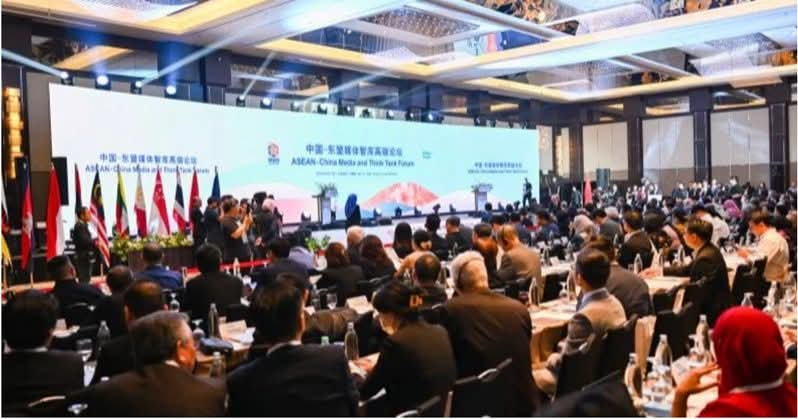
China, ASEAN media and think tanks urged to embrace AI, address its challenges
Leading figures from prominent media outlets and think tanks across China and the 10 ASEAN member states engaged in extensive discussions on artificial intelligence (AI) and other key topics during the China-ASEAN Media and Think Tank Forum held in Kuala Lumpur on Friday.
The forum, centered on the theme “Strengthening ASEAN-China Cooperation,” concluded with a joint consensus acknowledging that while the rapid growth of AI presents transformative opportunities, it also introduces uncertain risks and challenges.
The consensus emphasized that media and think tanks should proactively adapt to the ongoing technological revolution, leverage AI’s advantages, and contribute to building a smart future where innovation is coupled with a strong foundation of security.
Pamela Samia, acting executive news editor at the Philippine News Agency, noted that media and think tanks from ASEAN and China must embrace AI, as it greatly improves research capabilities, decision-making processes, and communication efficiency.
Despite this, she stressed the irreplaceable value of human expertise: “AI is merely a tool and can never replace human judgment and critical thinking.”
Veronika S. Saraswati, executive director of the Indonesia China Partnership Studies, said it is vital for ASEAN and Chinese media and think tanks to foster public critical thinking and promote AI systems rooted in local data and Eastern cultural values.
“Through these initiatives, countries in the Global South are expected to regain their voice in the digital realm, ensuring that AI becomes a tool for promoting equity rather than a means of Western dominance,” she said.
Sivanxay Siphankham, deputy director of the Lao News Agency, remarked that AI is instrumental in enhancing information exchange and cooperation between ASEAN and Chinese media. However, he emphasized the need for joint efforts to tackle challenges like misinformation, ensuring AI use remains transparent and human-centered.
Lee Chean Chung, chairman of Malaysia’s Center of Regional Strategic Studies, highlighted that ethical principles, data privacy, and algorithm transparency must form the foundation of AI-related policies. He said, “The mission of AI is to empower humans, not to replace them.”
Thida Tin, director general of the Media Development Department under Myanmar’s Ministry of Information, pointed out that every invention carries both benefits and drawbacks. She said achieving a balance between innovation and ethics is key, and that technological progress should serve all sectors of society while minimizing harm to the environment and vulnerable groups.
The forum, co-hosted by China’s Xinhua News Agency and Malaysia’s Bernama, drew around 260 participants from more than 160 media organizations, think tanks, government bodies, and businesses across China and the ASEAN region.
https://unb.com.bd/category/World/china-asean-media-and-think-tanks-urged-to-embrace-ai-address-its-challenges/157427
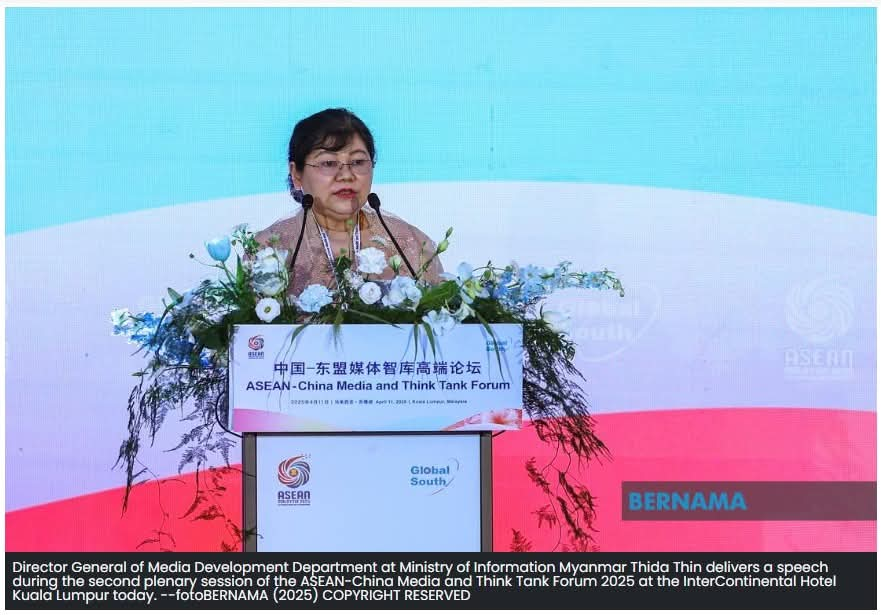
Myanmar Thanks ASEAN For Quake Aid, Seeks More Global Support
By Ahmad Erwan Othman
KUALA LUMPUR, April 11 (Bernama) - ASEAN's swift solidarity and humanitarian support have played a critical role in driving Myanmar's ongoing recovery efforts following the devastating earthquake that struck the country on March 28, Director-General of the Media Development Department under Myanmar's Ministry of Information, Dr Thida Tin, said.
She extended the people's gratitude to ASEAN member states for their swift response and invaluable support.
"Our government and social organisation are working together to ensure the fastest and the best possible recovery from the natural disaster with all available international assistance. I am convinced that your kind assistance reflects the true hearts of family spirit of the region and the value of our shared civilisation," she said during a plenary session of the ASEAN-China Media and Think Tank Forum, held here on Friday.
The ASEAN-China Media and Think Tank Forum was opened by Deputy Prime Minister Datuk Seri Fadillah Yusof earlier today, with Communications Minister Datuk Fahmi Fadzil and Xinhua News Agency's Editor-in-Chief Lyu Yansong among those present.
Also in attendance were Deputy Communications Minister Teo Nie Ching, Secretary-General of the Communications Ministry Datuk Mohamad Fauzi Md Isa, Bernama's Chairman Datuk Seri Wong Chun Wai, Bernama's Chief Executive Officer Datin Paduka Nur-ul Afida Kamaludin, and Bernama's Editor-in-Chief Arul Rajoo Durar Raj.
Jointly organised by Bernama and Xinhua News Agency under the theme 'Strengthening ASEAN-China Cooperation', the event drew over 200 participants - including influential media leaders, representatives, senior government officials and experts from across the ASEAN region and China to deepen engagement in the ever-evolving media landscape.
On March 28, Myanmar was struck by two powerful earthquakes - a 7.7-magnitude quake in the Sagaing Region, followed by a 6.4-magnitude quake further south - claiming the lives of at least 3,600 people, with thousands of others injured and hundreds more reported missing. However, Thida Tin said that while the people of Myanmar are doing their best to recover from the disaster, more assistance is still needed.
She emphasised that this includes not only urgent search and rescue efforts, but also support for rebuilding communities, restoring livelihoods, and helping people resettle in the long term. Therefore, she added, Myanmar warmly welcomes continued support from the international community for the recovery and reconstruction of earthquake-affected areas.
On April 5, Malaysia, as the ASEAN Chair, spearheaded the humanitarian mission to Myanmar led by Foreign Minister Datuk Seri Mohamad Hasan.
During the visit, Mohamad and his Thai counterpart Maris Sangiampongsa—who is co- leading the humanitarian mission-were scheduled to meet with the Chairman of the State Administration Council (SAC), Senior General Min Aung Hlaing, and Myanmar's Foreign Minister U Than Shwe in the capital.
On March 30, Prime Minister Datuk Seri Anwar Ibrahim announced that the Malaysian government would provide RM10 million in humanitarian aid as an initial contribution to Myanmar, which has been severely affected by the natural disaster.
BERNAMA
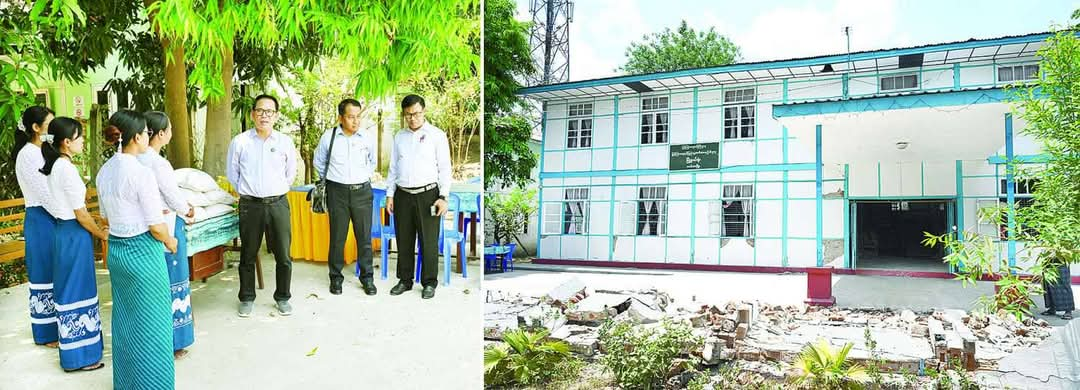
This year's Naypyitaw Thingyan will be celebrated as a Ice-water Thingyan
UNION Minister for Information U Maung Maung Ohn inspected the construction of pavilions for Ice-water Thingyan and food donation in Nay Pyi Taw Walking Thingyan area yesterday.The Nay Pyi Taw Walking Thingyan of this year will be held to honour the traditional Myanmar Thingyan that was listed on UNESCO’s Representative List of the Intangible Cultural Heritage of Humanity and efforts for Myanma Thanaka to be listed in the Representative List of the Intangible Cultural Heritage of Humanity, and it will also feature different events such as applying Thanaka, washing heads and cutting nails of elderly people, free food donation including Myanmar snacks daily.
Two years ago, Nay Pyi Taw Walking Thingyan was held crowdedly, but due to the Mandalay earthquake hit on 28 March, there were losses in Nay Pyi Taw Council Area, Sagaing Region, Bago Region, Magway Region, Mandalay Region and Shan State. Therefore, this year Thingyan will be celebrated as a peaceful Thingyan without any dances per the culture.The Union minister then inspected the damage at the IPRD office in Lewe Township and made proper instructions. He also provided the staff with cash and foodstuff.

He also observed the construction of temporary shelters for the staff at Dekkhinathiri district (training school), access to electricity, water and toilets. He also provided the staff with cash and foodstuffs.
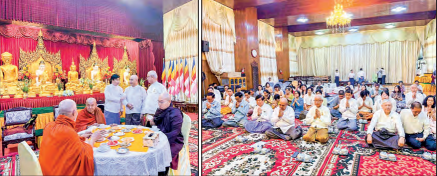
Myanmar-China Friendship Association donates gold foils to Shwedagon Pagoda
THE Myanmar-China Friendship Association (Central), along with partner groups, donated 19 ticals of gold foils, valued at K47.5 million, to the Shwedagon Pagoda. The donation ceremony took place at the Shwedagon Pagoda on 19 March, according to the Myanmar-China Friendship Association (Central).
The donation was jointly made by the Myanmar-China Friendship Association (Central), the Chinese Chamber of Commerce of Myanmar, the Yangon-Yunnan Association, the Myanmar-Hokkien (Fujian) Chinese National Association, and the Myanmar Cantonese Merchants and Entrepreneurs Association.
The donation ceremony was attended by Chairman Sayadaw of Yangon Region Dvipitaka Bhaddanta Aggasami, Shwedagon Ovada Cariya Hlayadana Sayadaw, and Shwepyitha Sayadaw. The donors took precepts from the Sayadaws, handed over the gold foils to the board of trustees, and listened to the Dhamma with meritsharing.

Internal stability key amid rapid shifts in multipolar world
Senior General Min Aung Hlaing noted that it is necessary to emphasize more flexible and good adaptation in the age of a multipolar world to be able to conduct diplomatic relations through the use of practical approaches.
The opening ceremony of the Challenges and the Opportunities Myanmar Will Have in the Multipolar World Beyond 2025 took place at the Myanmar International Convention Centre I in Nay Pyi Taw yesterday morning, with an address by Chairman of the State Administration Council Prime Minister Senior General Min Aung Hlaing.
Foreign experts were introduced individually. The forum was opened with the song and dance of artistes from the Fine Arts Department. Attendees watched a video clip on Myanmar and new landscapes in 2025.
Speaking on the occasion, the Senior General said: The world has undergone a paradigm shift to a multipolar world order. Just as we are witnessing the changes in the patterns by which the superpowers exert their influence on international relations, we are also beholding the increasingly important role of the regional blocs. In other words, the paradigm has been shifted from globalization to regionalization.
Previously, the world was dominated by only one superpower but now the pattern has been shifted from solitary dominance to collective leadership of many nations and blocs. This is what we now know as the multipolar world order. Nations such as China, India and Russia and a bloc like the European Union have developed by leaps and bounds and they are challenging the domination of the world by the superpowers.
Nowadays, the power is diverging to many nations and certain regional blocs, thereby striking a proper balance between and among the nations, depriving the world of power imbalance. At the same time, the influential nations are bent more on struggling to exert influence than on resolution of the international issues.
Under the multipolar world order, nations will be required to adapt themselves to suit the new geopolitical and geoeconomic conditions. To be able to fit into the transformational process comfortably and conveniently, the nations are required to make preparations and formulate the proper strategy.
In the first place, the strategic autonomy is needed. It is essential for the nations to avoid depending too much upon an individual superpower, extending the relations with the friend nations. Then only, decision-making will be flexible and the unnecessary pressures can be resisted with the synergic forces of the friends. The term friends refers not only to the nations but also to the regional blocs.
In extending relations with friends, it is essential to formulate arrangements that will develop sustainably. The ties shall be further strengthened in economic, security and technological fields. Concerning economic relations in particular, we all need to adapt ourselves to suit the changing situations in the new world order.
Plus, we must reduce overdependence on one market only. It is necessary to extend the trade relations to diversified regions. To be able to mitigate the losses that can arise from the global disruption, the regional economic integration is indispensable.
Participation is imperative to strengthen the regional supply chains. To ensure the safety of the national interests, emphasis is to be laid upon investments in such major sectors as food, energy and technology.
And what is more, technology and digital sovereignty are also the two sectors which are worth investing in. Technology has become a fundamental sector in the competition of the multipolar world order. Such particular technologies as Artificial Intelligence (AI), semiconductors and cybersecurity are the determining technologies. This being so, it is indispensable to keep strategic technological partners to cooperate in such sectors as artificial intelligence and the digital economy.
We ought to be more flexible and good at adaptation in the age of a multipolar world to be able to conduct diplomatic relations through the use of practical approaches.
Another sector which is worth considering seriously is energy and resource security. Exploration and exploitation of energy, water and rare metals have become vitally important to sustainable stability. We must therefore make investments in renewable energy, nuclear and other energy sectors. Arrangements are to be made to ensure a sufficient supply of rare metals and food security which can be disrupted by geopolitical causes.
Concerning the sociocultural sector, internal stability has become important as the power dynamic is shifting fast in the age of a multipolar world. It is imperative to fight fake news, develop the art of propagating via media and counter efforts to exert foreign influence. With the swift changes in the global economy, we have to invest in human resources to go along with the tide to survive. I would like to point out that the workforce needs to be properly educated and trained.
This forum will involve discussions and suggestions by seasoned experts from China, India, Russia, Thailand, Nepal, Japan and Italy, and so, this forum will contribute a lot towards turning Myanmar into a modern, developed nation beyond 2025. Your experts are expected to provide guidance, ways of showing and strategies for Myanmar.
And the international experts will witness the real situation while in Myanmar. I hope you will witness the true image of our country which is totally different from the distorted images through the use of fake and false news and views.
The Senior General expressed his recognition and appreciation to the Ministry of Information and the “Myanmar Narrative Think Tank” for their timely efforts in organizing this important discussion.
He said he wished for Myanmar to be connected with the international community while accurately representing its true image and fostering stronger friendships and mutual understanding.
The Senior General continued his discussions, saying that Myanmar and its neighbouring countries have a population of nearly four billion, accounting for approximately 50 per cent of the world’s population. This presents a strong market for exporting the country’s goods. Therefore, it is essential to effectively utilize the available resources within the country and strive to maximize their inherent value.
The armed conflict remains like an inextinguishable fire, not due to internal affairs alone but because of foreign encouragement and interference. As a result, Myanmar, despite having many opportunities, has lagged in development. These challenges can be transformed into opportunities and advantages, which ultimately contribute to fostering a love for our country, nurturing the Myanmar spirit, and building unity and strength. Without unity, no economic system can succeed, and no political system can firmly lead the nation.
Only when stability and peace are maintained will foreign investments flow into the country. It is necessary to provide guarantees for investment activities. This, in turn, will lead to the growth of the country’s GDP and the overall development of the economy. He said he is striving to continue advancing a multiparty democratic system that aligns with the will of the people and the country’s foundations. Moreover, the legitimate demands of ethnic groups are addressed in accordance with the law.
The Senior General presented medals to mark the forum to foreign experts and scholars. Experts in geopolitics and geoeconomics from China, Russia, India, Japan, Thailand, Italy, and Nepal, along with local experts, participated in discussions on three topics “The Role of Myanmar and Asia in a Changing Geopolitical World”, “Geoeconomic Challenges and Promising Opportunities Myanmar will face beyond 2025”, and “Geopolitical Challenges and Promising Opportunities for Myanmar Beyond 2025”.
The opening ceremony of the forum was also attended by Council Joint Secretary General Ye Win Oo, council members, Union ministers, union-level dignitaries, Ambassadors of foreign embassies to Myanmar and officials, the Nay Pyi Taw Council chairman, senior Tatmadaw officers from the Office of the Commander-in-Chief and deputy ministers.
The discussion forum was reportedly held to inform the world about Myanmar’s actual situation amid political transitions, fostering understanding and cooperation with Myanmar through empathy, countering false accusations to enhance the country’s image and preparing for the challenges and opportunities that may arise in the evolving multipolar world beyond 2025.

မန်းရွှေစက်တော်ဘုရားကြီး၏ (၂၅၉၁) ကြိမ်မြောက် ဗုဒ္ဓပါဒပူဇနိယဘုရားပွဲတော် ဖွင့်ပွဲအခမ်းအနား ကျင်းပ
မကွေးတိုင်းဒေသကြီး မင်းဘူး (စကု) မြို့နယ်ရှိ မန်းရွှေစက်တော်ဘုရားကြီး၏ (၂၅၉၁) ကြိမ်မြောက် ဗုဒ္ဓပါဒပူဇနိယဘုရားပွဲတော် ဖွင့်ပွဲအခမ်းအနားကို ဖေဖော်ဝါရီလ ၂ ရက် နံနက်ပိုင်းက ကျင်းပခဲ့သည်။ ဦးစွာ သက်ဆိုင်ရာတာဝန်ရှိသူများက မန်းရွှေစက်တော်ဘုရား ဗုဒ္ဓပါဒပူဇနိယဘုရား ပွဲတော်ဖွင့်ပွဲအထိမ်းအမှတ် မင်္ဂလာမုခ်ဦးဆိုင်းဘုတ်အား ဖဲကြိုးဖြတ်ဖွင့်လှစ်ပေးပြီး နေပြည်တော် လယ်ဝေးမြို့ နဂါးရုံတစ်ထောင် စမတောင်ကျောင်းဆရာတော် အဂ္ဂမဟာသဒ္ဓမ္မဇောတိကဓဇ၊ အဂ္ဂမဟာမင်္ဂလာဓမ္မ ဇောတိကဓဇ၊ ထေရဝါဒဗုဒ္ဓသာသနဇောတိက ဒေါက်တာဘဒ္ဒန္တဝံသသီရိနှင့် မကွေးတိုင်းဒေသကြီးဝန်ကြီးချုပ် ဦးတင့်လွင်တို့က မင်္ဂလာမုခ်ဦးဆိုင်းဘုတ်အား စက်ခလုတ်နှိပ် ဖွင့်လှစ်ပေးခြင်းအပြင် ဇီဝိတဒါနအဖြစ် ငှက်လွှတ်ခြင်းနှင့် ငါးလွှတ်ခြင်းများ ဆောင်ရွက်ခဲ့သည်။
ဆက်လက်ပြီး နိုင်ငံတော်သံဃမဟာနာယကအဖွဲ့၊ အဖွဲ့ဝင်၊ နေပြည်တော် ပျဉ်းမနားမြို့ အောင်စည်သာကျောင်းဆရာတော် ဘဒ္ဒန္တဝိစက္ခဏနှင့် နေပြည်တော်လယ်ဝေးမြို့ နဂါးရုံတစ်ထောင် စမတောင်ကျောင်းဆရာတော် ဒေါက်တာဘဒ္ဒန္တဝံသသီရိ အမှူးပြုသော ဆရာတော်ကြီးများ၊ မကွေးတိုင်းဒေသကြီးဝန်ကြီးချုပ် ဦးတင့်လွင်နှင့် တာဝန်ရှိသူများက အောက်စက်တော်ရာ (ခြေတော်ရာ) အလင်းပေါက် ဖန်အုပ်စောင်းတော်အား စက်ခလုတ်နှိပ်ဖွင့်လှစ်ခြင်း၊ အထက်စက်တော်ရာ ပါဒစေတီတော်မြတ် သံတံခါးအား ဖွင့်လှစ်ပေးခြင်းများ ဆောင်ရွက်ခဲ့ကြပြီး နမ္မဒါရေစင်နှင့် အမွှေးနံ့သာရည်များ သွန်းဖျန်း၍ ရွှေသင်္ကန်းများ ကပ်လှူပူဇော်ကာ ပင့်ဖိတ်ထားသော ဩဝါဒါစရိယဆရာတော်ကြီးများက ဗုဒ္ဓပါဒ စေတီတော် (ခြေတော်ရာ) နှစ်ဆူနှင့် အောက်စက်တော်ရာ (ခြေတော်ရာ) အနီးရှိ ဘုရားဝတ္တကနယ်မြေ၌ အသစ်တည်ထားကိုးကွယ်သော ဆုတောင်းပြည့် လိုတရနမ္မဒါနဂါးရုံဘုရားအား ဗုဒ္ဓါဘိသေက အနေကဇာတင် ဘိသိက်သွန်းတော်မူသည်။
ထို့နောက် တက်ရောက်လာကြသူများက ဩဝါဒါစရိယ ဆရာတော်ကြီးများထံမှ ငါးပါးသီလ ခံယူဆောက်တည်ကာ ပရိတ်တရားတော်များ နာယူကြည်ညိုကြ၍ လှူဖွယ်ဝတ္ထုပစ္စည်းများနှင့် နေ့ဆွမ်းများဆက်ကပ်လှူဒါန်းပြီး လှူဒါန်းမှုအစုစုတို့အတွက် ရေစက်သွန်းချအမျှပေးဝေခဲ့သည်။
မင်းဘူး (စကု) မြို့နယ်ရှိ မန်းရွှေစက်တော်ဘုရား ကြီးသည် မြန်မာနိုင်ငံ၏ (က) အဆင့်စာရင်းဝင် ဘုရားကြီးဖြစ်ပြီး မြန်မာနိုင်ငံအတွင်း၌ ထင်ရှား ကျော်ကြားပြီး ရက်အရှည်ကြာဆုံးသော ဘုရား ပွဲတော်ကြီးတစ်ခုဖြစ်ကြောင်း၊ ယခုနှစ် မန်းရွှေစက်တော်ရာ ပါဒစေတီတော်ဗုဒ္ဓပူဇနိယ ဘုရားပွဲတော် ကြီးကို ဖေဖော်ဝါရီ ၂ ရက်မှ ဧပြီ ၁၇ ရက်အထိ မဟာသင်္ကြန်ရုံးပိတ်ရက်အပါအဝင် (တပို့တွဲလဆန်း ၅ ရက်နေ့မှ မြန်မာနှစ်ဆန်း ၁ ရက်နေ့အထိ) ရက်ပေါင်း ၇၅ ရက်ကြာ စည်ကားသိုက်မြိုက်စွာ ကျင်းပမည်ဖြစ်ကြောင်း၊ အနယ်နယ်အရပ်ရပ်မှ ဘုရားဖူးလာရဟန်းရှင်လူမိဘပြည်သူများ ညအိပ် တည်းခိုနားနေနိုင်စေရန် တည်းခိုဆောင်အခန်းပေါင်း ၃၀၀ ကျော်နှင့် ဈေးဆိုင်ခန်းပေါင်း ၃၅၀ ခန့်ကို ဆောက်လုပ်ပေးထားပြီး ယခုအခါ (၂၅၉၁) ကြိမ်မြောက် ဗုဒ္ဓပူဇနိယပွဲတော်ကြီးအဖြစ် ဖွင့်လှစ်နိုင်ခဲ့ခြင်း ဖြစ်ကြောင်း မန်းရွှေစက်တော်ဘုရားဂေါပကအဖွဲ့ထံမှ သိရသည်။
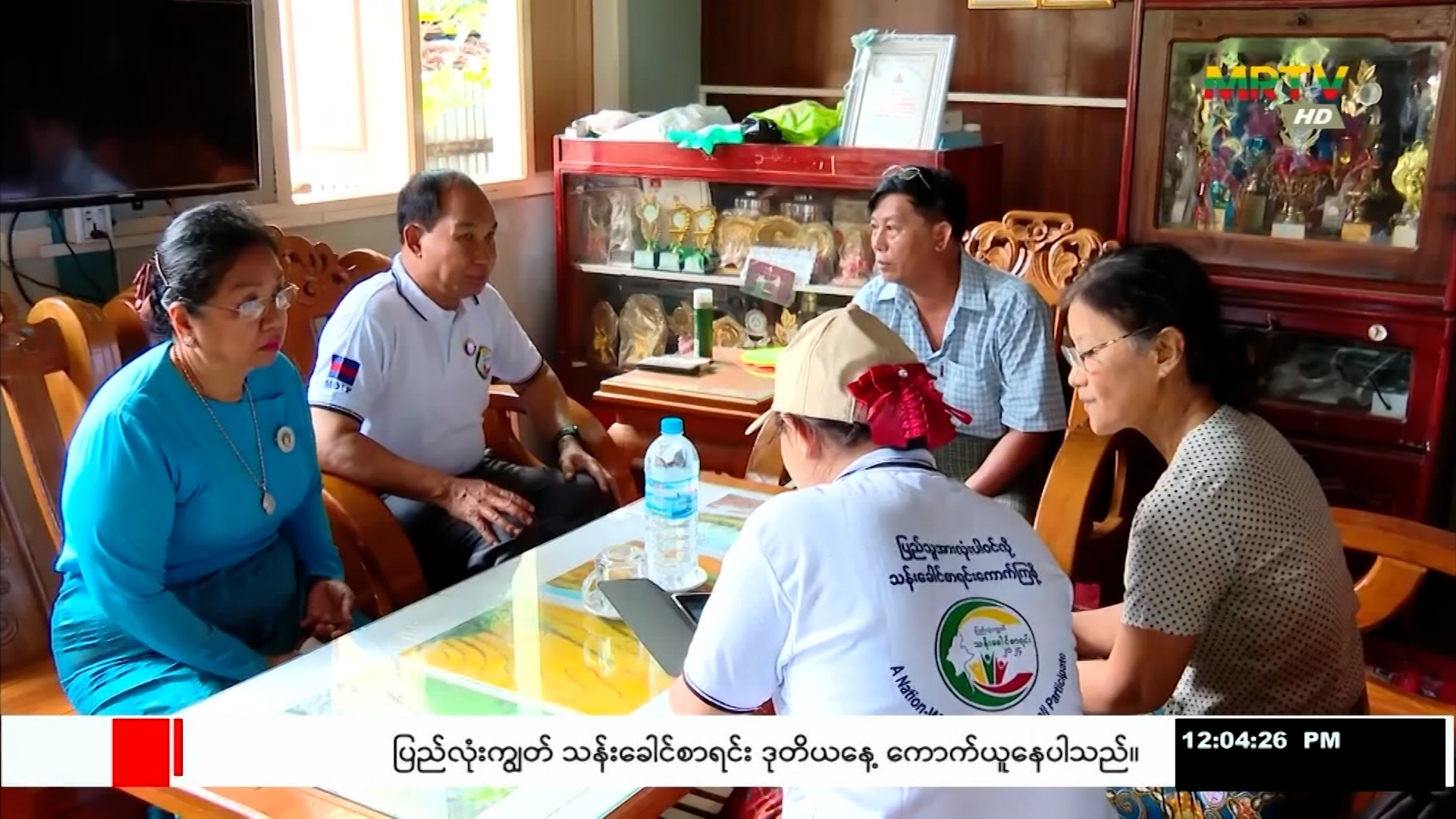
The 2024 population and housing censuses have begun in Sagaing Region, Homalin District, and the districts and townships within the region.
The 2024 Population and Housing Censuses have begun in Sagaing Region, Homalin District and the districts and townships within the region. The 2024 Population and Housing Censuses have begun in Sagaing Region, Homalin District and the districts and townships within the region. The 2024 Population and Housing Censuses have begun in Sagaing Region, Homalin District and the districts and townships within the region. The 2024 Population and Housing Censuses have begun in Sagaing Region, Homalin District and the districts and townships within the region.
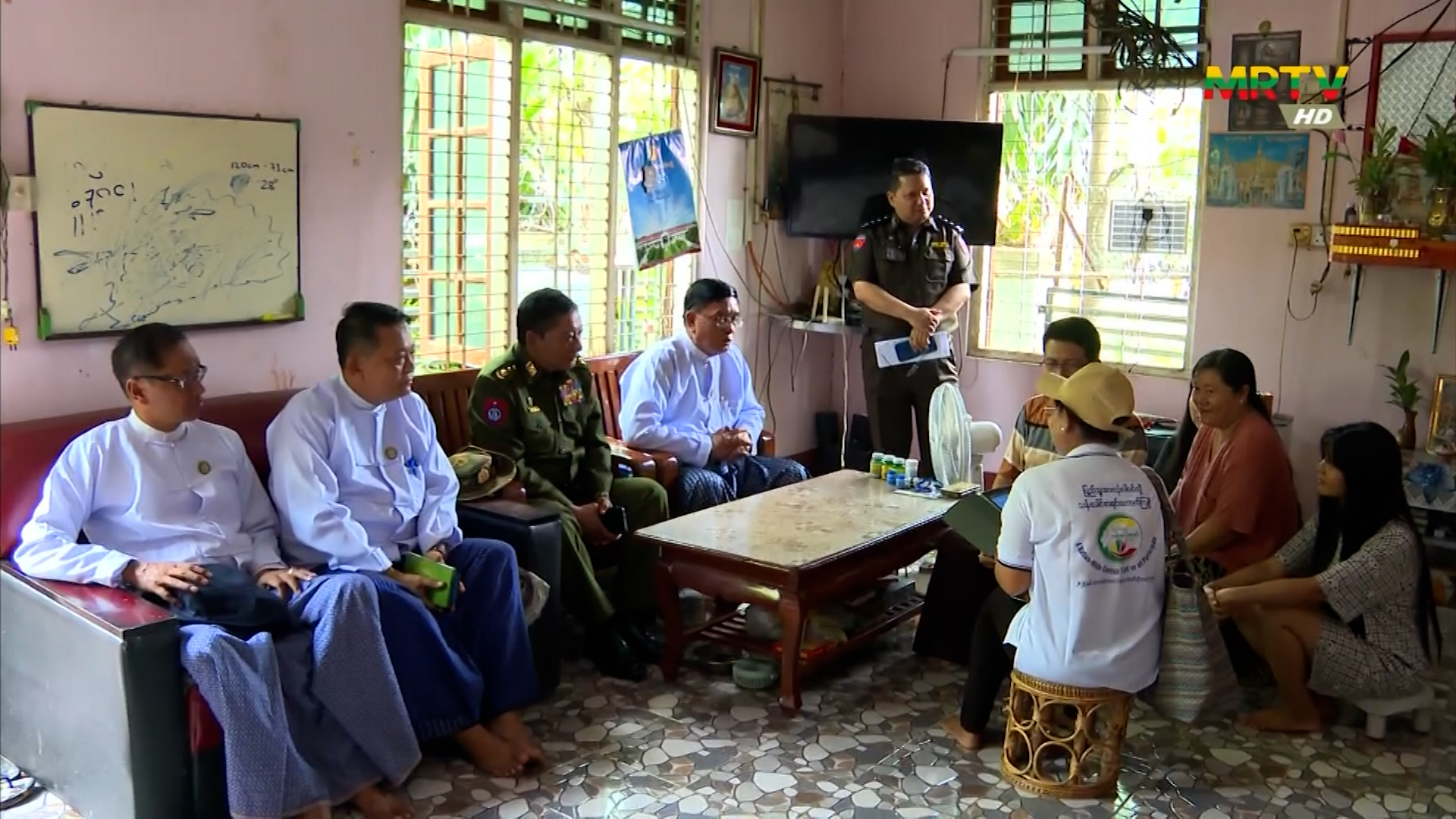
The 2024 Population and Housing Census has begun in Magway Region.
The 2024 Population and Housing Census has begun in Magway Region. The 2024 Population and Housing Census has begun in Magway Region. The 2024 Population and Housing Census has begun in Magway Region. The 2024 Population and Housing Census has begun in Magway Region.
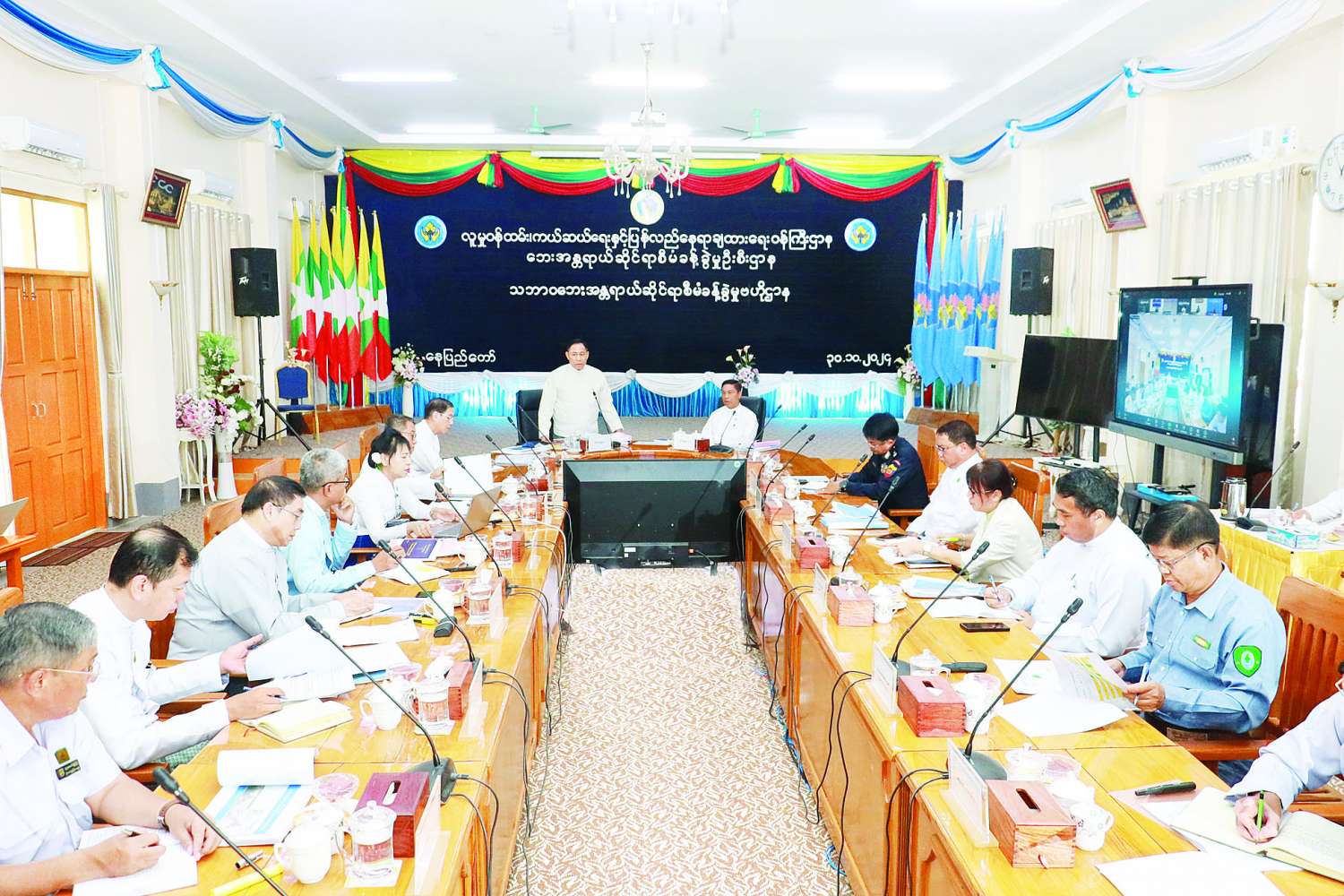
Disaster Management Center holds work coordination meeting
The Disaster Management Center Coordination Meeting was held this afternoon at the Disaster Management Center of the Ministry of Social Welfare, Relief and Resettlement. The meeting was attended by the Vice Chairman (1) of the National Disaster Management Committee, Union Minister for Home Affairs, Lt. Gen. Ya Pyae, Vice Chairman (2) of the National Disaster Management Committee, Union Minister for Social Welfare, Relief and Resettlement, Dr. Soe Win, Permanent Secretaries, Directors General, Directors General members of the Working Committee, and officials.




